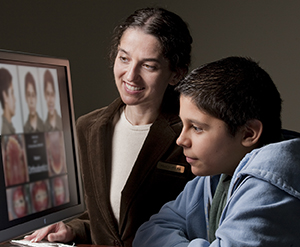A
B
C
D
E
F
G
H
I
J
K
L
M
N
O
P
Q
R
S
T
U
V
W
X
Y
Z
Click a letter to see a list of conditions beginning with that letter.
Click 'Topic Index' to return to the index for the current topic.
Click 'Library Index' to return to the listing of all topics.
Supportive Treatment for a Cleft Lip or Palate
Treatment can help your child develop physically and emotionally. Your child’s healthcare team will work with you and your child to ensure the best possible outcome. This sheet gives you tips on how to prepare your child for these important treatments.
Dental and orthodontic care
-
Help your child practice good oral hygiene. This means making sure your child’s teeth are brushed after every meal and flossed at least once a day. Your child should not have sweet, sticky foods and juices.
-
Have your child’s teeth looked at by an orthodontist. Talk to them about treatments your child may need in the future, such as braces or implants. This is especially important if your child has a cleft palate that affects the gum. The orthodontist can help improve how your child’s mouth functions and looks.
-
Be sure your child wears any prescribed spacers or guards as instructed. They help with normal mouth function. Your child will likely need to wear these dental appliances for the rest of their life.
-
Cleft palate that affects the gum often causes teeth to grow in abnormally. Your child will likely need braces to straighten the teeth. Braces can be used to fix baby or adult teeth. Your child may also need to have their jaw fixed or have missing teeth replaced.
-
Follow up with the pediatric dentist and orthodontist. Your child will need regular mouth care for the rest of their life.

Speech therapy and swallowing
Your child will likely begin speech therapy before surgery to repair the cleft lip or cleft palate. Therapy will continue after surgery. The speech pathologist will help your child relearn where to place the tongue, how to say words, and how to swallow, if needed. Expect your child to work with a speech pathologist until your child can speak well. Many children with cleft lip, cleft palate, or both, develop normal speech at about age 6 or 7 years old. But it varies, depending on the child and how severe the cleft was.
Emotional care
-
Help your child cope with social and emotional issues. Explain to your child that other children tend to react poorly to differences. Reassure your child that they have done nothing wrong.
-
Give your child a lot of positive feedback about their appearance. This will boost your child’s self-esteem. Positive messages from loved ones also help your child face other people’s insensitive words and actions.
-
Talk with your child's teachers about your child's cleft lip or palate. Ask the teacher what they can do in the classroom to help other children understand cleft lip or palate. If your child is old enough, ask your child how they would like the classroom situation managed. This will help ensure that your child has support in the classroom.
Online Medical Reviewer:
Ashutosh Kacker MD
Online Medical Reviewer:
Ronald Karlin MD
Online Medical Reviewer:
Tara Novick BSN MSN
Date Last Reviewed:
12/1/2022
© 2000-2026 The StayWell Company, LLC. All rights reserved. This information is not intended as a substitute for professional medical care. Always follow your healthcare professional's instructions.